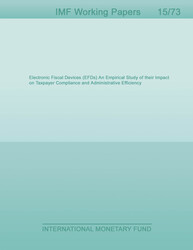
Electronic Fiscal Devices (EFDs) An Empirical Study of their Impact on Taxpayer Compliance and Administrative Efficiency
Several administrations have adopted electronic fiscal devices (EFDs) in their quest to combat noncompliance, particularly as regards sales and the value-added tax (VAT) payable on sales. The introduction of EFDs typically requires considerable effort and has costs both for the administration and for the taxpayers that are affected by the requirements of the new rules. Despite their widespread use, and their considerable cost, EFDs can only be effective if they are a part of a comprehensive compliance improvement strategy that clearly identifies risks for the different segments of taxpayers and envisages measures to mitigate these risks. EFDs should not be construed as the "silver bullet" for improving tax compliance: as with any other technological improvement the deployment of fiscal devices alone cannot achieve meaningful results, whether in terms of revenue gains or permanent compliance improvements.
Publication date: March 2015
ISBN: 9781475521023
$18.00
Add to Cart by clicking price of the language and format you'd like to purchase
Available Languages and Formats
| English |
Prices in red indicate formats that are not yet available but are forthcoming.
Topics covered in this book
This title contains information about the following subjects.
Click on a subject if you would like to see other titles with the same subjects.
Economics- Macroeconomics , Economics / General , International - Economics , Tax administration , electronic fiscal devises , noncompliance , VAT
Summary
Copyright © 2010 - 2024
Powered by:
AIDC



